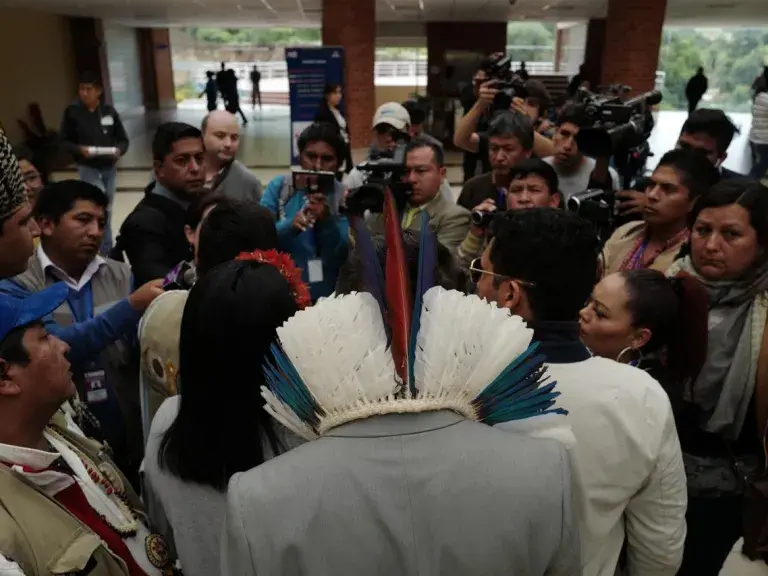
It wasn’t long ago that Brazil was held up as a model demonstrating the potential for reducing deforestation by strengthening indigenous peoples’ legal land rights. Brazil has some of the world’s most progressive environmental legislation, and the obligation to recognize indigenous peoples’ rights to their ancestral territories is embedded in the country’s 1988 Constitution. Brazil has been a centerpiece in many studies that show indigenous land owners are the most successful at resisting deforestation pressures compared to other land owners, including government owned and managed protected areas.
Today, at the pace that Brazil is rolling back protections for indigenous peoples and the environment, we risk those scientific studies reading like fairy tales for future generations. The commitments Brazil has made under the Paris Agreement on Climate Change, including a promise of zero illegal deforestation in the Amazon by 2030, already feels like far-fetched fantasy.
To be fair, the attacks on Brazil’s indigenous peoples did not start with the election of President Jair Bolsonaro. Indigenous lands have long been invaded and pillaged by illegal loggers, miners, and land thieves, and indigenous leaders and activists have been killed for trying to stand in their way. Proposals to terminate land rights for indigenous peoples and strip environmental laws have been gaining ground for several years as the agricultural, mining, and energy sectors became more politically powerful and argued that such protections inhibit economic growth.
The situation of indigenous peoples in Brazil has been worsening for years, but under the current administration, Brazil is moving dangerously fast toward a tipping point from which the Amazon rainforest – and the indigenous peoples who depend on it for their survival – cannot recover.
President Bolsonaro’s policies and actions to cut funding and staffing to enforce environmental laws and safeguards for indigenous peoples and open the Amazon to agricultural and extractive industries have given license to unchecked deforestation, fires, and illegal invasions into indigenous lands. Criminal loggers, ranchers, and land thieves are clearing the Amazon with impunity. According to Brazil’s Indigenous Missionary Council, CIMI, the number of indigenous territories that have been invaded, illegally logged or mined, or have incurred other property damage doubled in the first nine months of the Bolsonaro government compared to all of 2018.
Bolsonaro’s incendiary anti-indigenous rhetoric has emboldened ruralistas – agribusiness, cattle ranchers, loggers and others – who are stepping up their violent attacks. The day Bolsonaro was voted into office, a Pankararu health clinic and school were firebombed and residents of a Guaraní Kaiowá indigenous village were shot at. Clashes with indigenous peoples are growing in frequency and severity. The assassinations and shootings of members of the Guajajara Tribe in November and December are two of the most recent tragedies.
In early December, two gunmen traveling by car opened fire on a group of Guajajara people in the Cana Brava indigenous reserve. Two men were murdered and two others were wounded. The group was returning to their village after advocating for their rights at a meeting with representatives from FUNAI, Brazil’s Indian affairs agency, and Eletronorte, a power company. The attack happened not far from where two members of the Guajajara’s team of forest guardians were ambushed by gunmen a month earlier. They were both shot; one was killed instantly and the other was wounded but managed to escape.
If there is a silver lining to the fires in the Amazon this year it is that standing up for the rights of indigenous peoples in the Amazon has become a global environmental imperative. The Center is working with indigenous leaders and advocates in Brazil to keep international experts and national leaders informed about the worsening and increasingly dangerous situation for indigenous peoples in Brazil. International attention may be one of the best and only ways to get Brazil to reverse course. It was diplomatic pressure that spurred Bolsonaro to change his stance and address the fires in the Amazon, and we’ll be working to mobilize that same kind of support from world leaders and other influential actors in defense of indigenous rights.
We are only just getting started, but our advocacy is already informing the reports of international human rights experts and bodies in the United Nations and Organization of American States. We've fostered support for action by the U.S. House of Representatives (H.RES.594) and Senate (S.RES 337), and we've helped build solidarity among Indian nations in the United States (National Congress of American Indians Resolution #ABQ-19-022).
Learn more:
indianlaw.org/brazil/updates-and-news and indianlaw.org/brazil/international-advocacy
